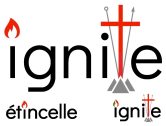Reflection for Palm Sunday
By: Andrea D’Silva (Ignite Young Adult Team Leader, Toronto)

Last year on Palm Sunday I sat in the pub across the street from my church with a beer and a palm I folded into a cross. A gentleman at a table nearby struck up a conversation with me asking how I fashioned my palm into a cross. As I attempted to fold his palm, he began telling me about his baby who had been born prematurely. Due to some complications, him and his wife had already been in the hospital for a few weeks. But things were getting better, their baby was doing well and soon they were looking forward to taking their little one home. I failed miserably at folding the palm and offered him the one I had already made into a cross. He thanked me graciously and went back to his family.
This year there will be no such encounter with a stranger. This year we enter Holy Week in a strange kind of silence. Isolated. Alone. In the gospel of Matthew that we will hear this Sunday, Jesus tells two of his disciples to go into the village, where they would find a donkey tethered and a colt with her. He asks them to untie them and bring them to him. If anyone asks, tell them that the Lord needs them. The colt, which is a young donkey, and its mother were brought to Jesus. They laid their cloaks upon them and Jesus sat on them and entered Jerusalem, where he was greeted by the crowd that shouted, “Hosanna to the Son of David.” This was the fulfillment of the prophecy in Zechariah 9:9:

“Say to Daughter Zion, ‘See, your king comes to you, gentle and riding on a donkey, and on a colt, the foal of a donkey.’”
The Gospel of Matthew alone mentions a donkey and a colt, whereas Mark, Luke and John only mention a colt. So was Matthew confused or did he write an incorrect account of the story? Some scholars think that the colt and the ass in Zechariah’s prophecy are the same animal mentioned in different ways and perhaps Matthew was a Gentile rather than a Jewish Christian. The donkey signifies Israel and its covenant with God and the colt signifies the Gentiles, unfamiliar with God and his Law. Jesus brings the two together under His heavenly Jerusalem.1 This king entered Jerusalem to face his death not on a horse, a sign of war and conquest, but in humility and peace, on a gentle donkey.
When I hear this gospel I find myself thinking of that young donkey. As I walked the Camino de Santiago last year, I had the opportunity to observe several donkeys along the way. Unlike the curious horses and friendly cows, they appeared more cautious. They seemed gentle enough so I would approach them, only to find them either braying or backing away from me. I was later told that donkeys have a high level of self-preservation. Trust between the animal and its handler is important, otherwise one might find oneself stuck with a stubborn donkey. Now imagine the young donkey entering Jerusalem. He has never been ridden before and has probably never seen another place apart from his home. How terrified must he have felt with a stranger on his back and people screaming at him. Yet he continues moving forward, trusting his handler to guide him.
During this time of isolation perhaps we too feel scared, anxious and find ourselves in unchartered territory like that little donkey. Our news outlets constantly throw new information at us every day. Every day brings new uncertainties, more fears, more COVID-19 cases, more deaths, extends closures of schools, businesses and churches. We are not sure when this pandemic will all end and when we can continue to resume our “normal” lives – go to Church, meet our friends again, hang out at that favourite pub or go to the gym. But when this all ends, I can only hope that our lives will not go back to “normal.” Our lives should be transformed.

Where we cannot wait to receive the sacraments again. Where we stop checking our phones when in the company of our friends. Where we are present in the moment and not constantly worried about the future because today’s troubles are enough for today. Where we learn to trust in His providence because if He cared enough for that little beast, how much more must He care for our needs. Where we know that we are gently guided by Someone that loved us enough to die for us.
As we journey into Holy Week we won’t have new palms this year. But perhaps the old palms we saved from last year might remind us of the way “things used to be.” May this time be an opportunity to reflect and be transformed and renewed in our faith during this holy season. In the word of St. John Paul II, may we be assured that “There is no cross to bear that Christ has not already born for us, and does not now bear with us.”
1. Ignatius Catholic Study Bible New Testament. Second Catholic Edition RSV. 2010.
